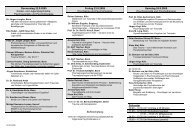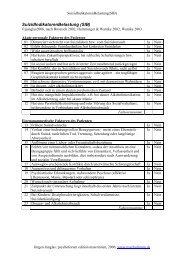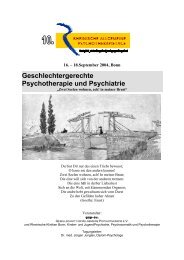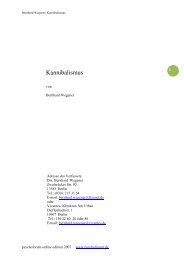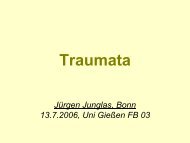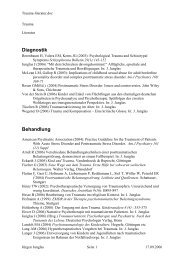Experimentelle Untersuchung von Versprechern bei Zwangspatienten ...
Experimentelle Untersuchung von Versprechern bei Zwangspatienten ...
Experimentelle Untersuchung von Versprechern bei Zwangspatienten ...
Sie wollen auch ein ePaper? Erhöhen Sie die Reichweite Ihrer Titel.
YUMPU macht aus Druck-PDFs automatisch weboptimierte ePaper, die Google liebt.
<strong>Experimentelle</strong> <strong>Untersuchung</strong> <strong>von</strong> <strong>Versprechern</strong> <strong>bei</strong> <strong>Zwangspatienten</strong><br />
Marascuilo, L.A. & McSweeney, M. (1977). Nonparametric and distrubition-free methods for<br />
the social sciences. Monterey, CA: Brooks/Cole.<br />
Marx, E. (2000). Versprecher und Genusverar<strong>bei</strong>tung. Analysen spontaner und experimentell<br />
erzeugter Sprechfehler. In G. Rickheit, D. Metzing (Hrsg.), Psycholinguistische<br />
Studien. Wiesbaden: DUV.<br />
Marx, E. (2001). Gewusst wu – gewusst wie! Was die Versprecherforschung über<br />
Sprachproduktion weiß. Psychologische Rundschau 52, 195-204.<br />
Marx, E. (2004). Methoden der Erhebung <strong>von</strong> Versprecherdaten in der<br />
Sprachproduktionsforschung: Probleme und Lösungsansätze. In E. Erdfelder & J.<br />
Funke (Hrsg.), Allgemeine Psychologie und deduktivistische Methodologie. Göttingen:<br />
Vandenhoeck & Ruprecht.<br />
Mattson, M.E. & Baars, B.J. (1992). Error-Minimizing Mechanisms. Boosting or Editing? In<br />
B.J. Baars (Hrsg.), Experimental slips and human error. Exploring the architecture of<br />
volition (S. 263-287). New York: Plenum Press.<br />
Meringer, R. (1908). Aus dem Leben der Sprache. Versprechen. Kindersprache.<br />
Nachahmungstrieb. Berlin: B. Behrs Verlag.<br />
Meringer, R. & Mayer, C. (1895). Versprechen und Verlesen. Eine psychologischlinguistische<br />
Studie. Stuttgart: Göschen`sche Verlagshandlung.<br />
Moritz, S., Birkner, C., Kloss, M., Jahn, H., Hand, I., Haasen, C. & Krausz, M. (2002).<br />
Executive functioning in obsessive-compulsive disorder, unipolar depression, and<br />
schizophrenia. Arch Clin Neuropsychol 17(5,) 477-83.<br />
Motley, M.T. (1980). Verification of “Freudian slips” and semantic prearticulatory editing via<br />
laboratory-induced spoonerisms. In V.A. Fromkin (Hrsg.), Errors in linguistic<br />
performance. Slips of the tongue, ear, pen, and hand (S. 133-147). New York:<br />
Academic Press.<br />
Motley, M.T. (1986) On replicating the SLIP-technique: A reply to Sinsabaugh and Fox.<br />
Communication Monographs 52, 342-351<br />
Motley. M.T. & Baars, B.J. (1974). Encoding sensitives to phonological markedness and<br />
transitional probability. Evidence from spoonerisms. Human Communication<br />
Research 1, 353-361.<br />
Motley, M.T. & Baars, B.J. (1976a). Semantic bias effect on the outcomes of verbal slips.<br />
Cognition 4, 177-187.<br />
Motley, M.T. & Baars, B.J. (1976b). Laboratory induction of verbal slips: A new method for<br />
psycholinguistic research. Communication Quarterly 24, 28-34.<br />
Motley, M.T. & Baars, B.J. (1979). Effects of cognitive set upon laboratory induced verbal<br />
(freudian) slip. Journal of Speech and Hearing Research 22, 421-431.<br />
145




